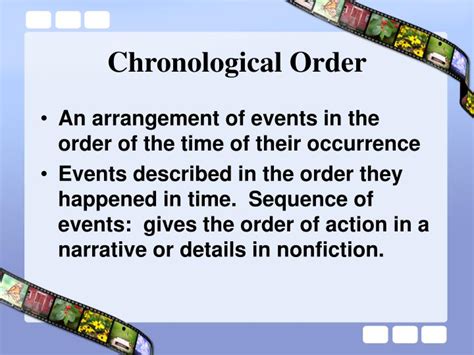Understanding chronological order is essential in various aspects of life, including history, literature, and even everyday organization. At its core, chronological order refers to the arrangement of events or items in the sequence they occurred or were created, from the earliest to the latest. This concept is fundamental in tracking progress, understanding cause and effect, and analyzing changes over time.
Importance of Chronological Order

The importance of chronological order lies in its ability to provide a clear and logical sequence of events. This is particularly significant in historical studies, where understanding the timeline of events is crucial for analyzing the past, its impact on the present, and potential implications for the future. In literature, chronological order can enhance the reader’s comprehension of the plot and character development, although authors often experiment with non-linear narratives to create suspense or highlight themes.
Practical Applications
Beyond academic and literary contexts, chronological order has practical applications in daily life. For instance, in project management, tasks are often organized chronologically to ensure that each step is completed before moving on to the next, which helps in meeting deadlines and achieving objectives efficiently. Similarly, in personal time management, organizing tasks in chronological order can help individuals prioritize their activities, making them more productive.
| Aspect | Importance of Chronological Order |
|---|---|
| Historical Analysis | Provides a clear timeline of events, facilitating understanding of historical contexts and cause-and-effect relationships. |
| Literary Comprehension | Enhances reader understanding of plot progression and character development, although non-linear narratives are also used for effect. |
| Project Management | Ensures tasks are completed in a logical and timely manner, aiding in project efficiency and goal achievement. |
| Personal Time Management | Aids in prioritizing tasks, increasing productivity and reducing stress by organizing activities in a logical sequence. |

Key Points
- Chronological order is the arrangement of events or items in the sequence they occurred.
- It is crucial for historical analysis, understanding cause and effect, and tracking progress over time.
- Chronological order enhances literary comprehension by providing a clear plot sequence.
- It is essential in project management for efficient task completion and meeting deadlines.
- Applying chronological order in personal time management can increase productivity and reduce stress.
Implementing Chronological Order

Implementing chronological order involves several steps, starting with identifying all relevant events or tasks. These are then arranged in a timeline based on when they occurred or need to occur. For historical or literary analysis, this might involve researching dates and events. In project management and personal time management, it involves setting realistic deadlines and prioritizing tasks based on their urgency and importance.
Challenges and Considerations
While chronological order is a powerful tool for organization and analysis, there are challenges and considerations to keep in mind. In historical studies, the accuracy of dates and the interpretation of events can be subject to debate. In literature, authors may intentionally disrupt chronological order to achieve specific narrative effects. In practical applications, flexibility is key, as unforeseen events can require adjustments to planned timelines.
What is the primary benefit of using chronological order in project management?
+The primary benefit is that it ensures tasks are completed in a logical and efficient sequence, contributing to the overall success and timely completion of the project.
How does chronological order aid in historical analysis?
+It provides a clear timeline of events, making it easier to understand the context and the cause-and-effect relationships between historical events, thus facilitating a more accurate analysis of the past.
Can chronological order be applied in personal activities like journaling or travel planning?
+Yes, applying chronological order in these activities can enhance their effectiveness. In journaling, it helps in tracking personal growth and changes over time. In travel planning, it ensures that all necessary preparations and activities are undertaken in a timely and logical manner.
In conclusion, chronological order is a fundamental concept that offers numerous benefits across various domains, from historical and literary analysis to practical applications in project management and personal time management. Its implementation requires careful consideration of the sequence of events or tasks, and while it presents several challenges, the advantages it offers in terms of clarity, efficiency, and comprehension make it an indispensable tool in both professional and personal contexts.



